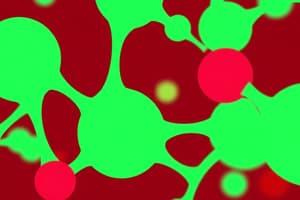Podcast
Questions and Answers
What does physiological psychology primarily focus on?
What does physiological psychology primarily focus on?
- The evolutionary aspects of psychology
- The genetic influences on behavior
- The physiological mechanisms underlying behavior (correct)
- The effects of external environments on mental processes
Which historical figure declared that the brain is the source of intellect?
Which historical figure declared that the brain is the source of intellect?
- Galen
- Hippocrates (correct)
- Anton van Leeuwenhoek
- René Descartes
Which discovery was made by Bell and Magendie during the 1800s?
Which discovery was made by Bell and Magendie during the 1800s?
- Electricity does not transmit messages in the nervous system
- Neurons communicate in multiple directions
- Sensation and movement are processed in the same pathway
- Neurons communicate in one direction (correct)
What broader field does biological psychology encompass?
What broader field does biological psychology encompass?
What did Galvani and du Bois-Reymond discover about the nervous system?
What did Galvani and du Bois-Reymond discover about the nervous system?
Which of the following best describes the contributions of Paul Broca?
Which of the following best describes the contributions of Paul Broca?
What concept did René Descartes introduce?
What concept did René Descartes introduce?
What inaccurate theory was demonstrated by Gall and Spurzheim?
What inaccurate theory was demonstrated by Gall and Spurzheim?
Study Notes
Overview of Physiological and Biological Psychology
- Branch of psychology focused on biological foundations of behavior, emotions, and mental processes.
- Explores brain chemistry and nervous system connections to psychological states.
Physiological Psychology
- Emphasizes mechanisms underlying behavior and mental processes.
- Utilizes direct manipulation and measurement of brain activity and bodily functions for insights into psychological phenomena.
Biological Psychology
- Broader field encompassing physiological psychology.
- Integrates studies of genetics, evolution, and biological bases of behavior.
- Incorporates insights from various biological sciences to understand human behavior.
Historical Highlights in Biological Psychology
Ancient Observations
- Ca. 3000 BC: Egyptians removed the brain during mummification; accurate case studies recorded regarding neural disorders.
- Ca. 400 BC - 200 AD:
- Hippocrates posits that the brain is the seat of intellect.
- Galen conducts dissections, recognizing nerve function but incorrectly attributing message transmission to bodily fluids.
Renaissance to Enlightenment (1600-1800)
- René Descartes introduces the concept of mind-body dualism and hydraulic mechanisms of communication.
- Anton van Leeuwenhoek invents the light microscope, enhancing biological study.
- Galvani and du Bois-Reymond uncover electrical transmission in the nervous system.
19th Century Advances (1800-1900)
- Bell and Magendie establish that neurons communicate directionally; differentiate pathways for sensation and movement.
- Paul Broca identifies the area of the brain responsible for speech production.
- Gall and Spurzheim challenge phrenology while affirming localized brain function.
- Fritsch and Hitzig reveal motor function localization within the cerebral cortex.
20th Century Developments (1900-Present)
- Ramón y Cajal asserts that the nervous system comprises individual cells.
- John Hughlings Jackson describes a hierarchical organization of brain functions.
- Otto Loewi demonstrates chemical signaling at synapses.
- Charles Sherrington coin the term “synapse,” receiving a Nobel Prize in 1932 for his work in neurophysiology.
Studying That Suits You
Use AI to generate personalized quizzes and flashcards to suit your learning preferences.
Description
This quiz explores the branch of psychology that focuses on the biological underpinnings of behavior, emotions, and mental processes. Students will examine the influence of brain chemistry and the nervous system on psychological states and behaviors. Test your understanding of physiological mechanisms in psychology.




